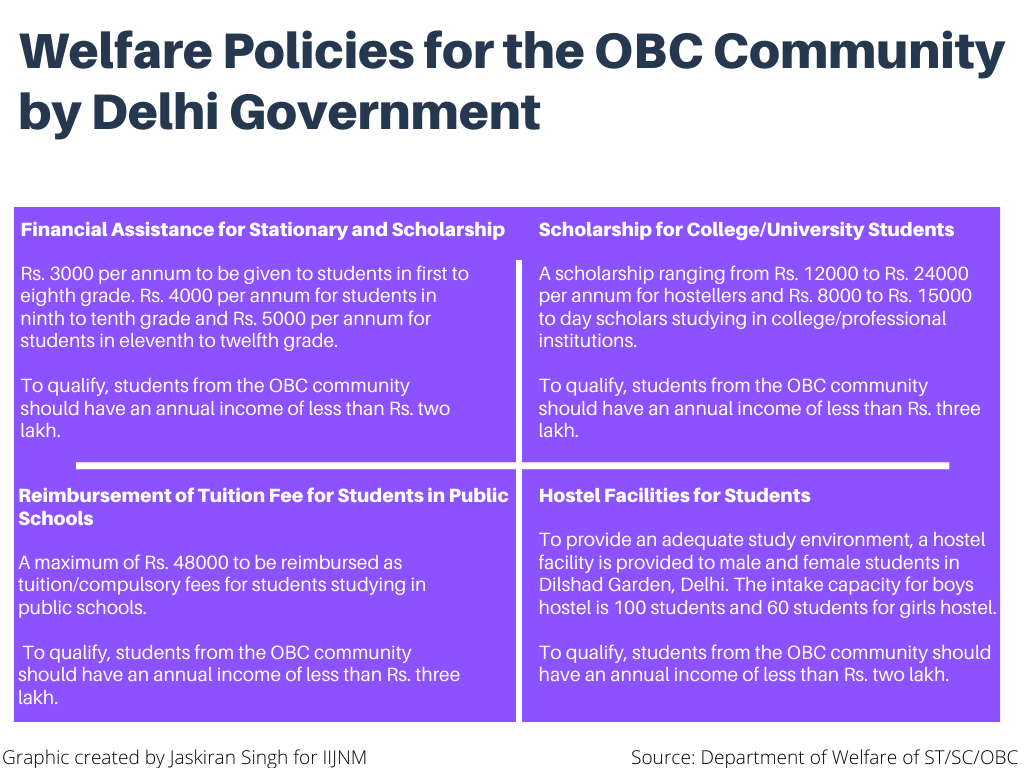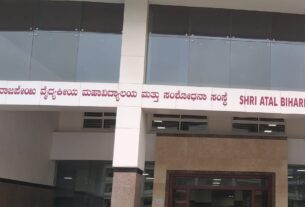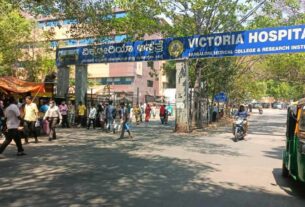A report found that the commission had not prepared any annual reports for the past 20 years.
The Commission for Other Backward Classes (OBC) was found to be in “non-compliance” with the orders mandated by the finance department of the Delhi government, revealed a report tabled in March 2021 by the Delhi Legislative Assembly. The orders require all autonomous bodies/grantee institutions to submit annual reports and audited financial statements along with physical performance-cum-achieve reports before the assembly.
Due to the lack of annual reports, monitoring and evaluating the performance of the commission, and thereby fixing accountability will be difficult for the government, said the report. The commission has failed to produce any documents indicating targets, along with approved programs and schemes, noted the report.
Sarika, a student at Jawaharlal Nehru University (JNU), said that in her 10 years of living in Delhi, she did not hear of the commission. “From my experience in the city, I can say that the current government has a more general approach (towards welfare policies) which does not specifically look into the issues of our (OBC) community,” she said.
Anagha, another JNU student, said, “I have been in Delhi for the past two-three years, and I have never seen any efforts from the government to reach out to the people regarding the commission and what they do.”
Constituted in 1993 by the then Lt. Governor of Delhi Prasannabhai Karunashankar Dave, the Commission for Other Backward Classes’ prime function is to entertain, examine and recommend upon requests for the inclusions in the list Other Backward Classes and to communicate such advice to the government. The commission consists of five members; the chairperson is a retired civil servant or a Supreme or High Court judge or a prominent public figure.
The latest annual survey of Delhi held that there are 65 castes which have been notified as Other Backward Classes in Delhi. Similarly, it said that there is no “authentic” estimate available regarding the OBC population in Delhi. However, the Social justice ministry’s 2018 data noted that the OBC population of Delhi is around 20 percent of its total population as per 2011 census data.
Government Inaction
President of the All India Dhangar Samaj Mahasabha, Mahendra Singh Dhangar commented on the larger attitude of Delhi’s governments towards the OBC community and said that during the budget allotments OBC used to get almost no funds while for SC/ST there used to be some money, which, too came after a lot of pushing.
“Even when I was a second class officer in the Delhi government, I saw that politicians only care about votes. I remember them saying, ‘Elections are near, we do not want to upset anyone. Do whatever is required’. Their motivation was never the welfare of any community but only vote welfare. All governments have been the same; they work on the metaphor: Look behind to see ahead,” he said.
“Very rarely has there ever been a good politician or a bureaucrat who actually wants to do well for the people. Things are happening in a casual way, sometimes things happen, sometimes they don’t,” he added.

Rishabh, a student at the University of Delhi (DU) said, “While getting scholarships in schools is systematized, for university education it is very tricky. I have not heard of anyone getting OBC scholarships in my college in DU. I also remember that our professor was making lists of OBC students as the Delhi government had announced that they will give financial assistance to those preparing for civil services exams. But I have not heard back since.”
The representatives of the Commission of OBC have maintained at multiple meetings that they suffer from a lack of funding and manpower, causing them hindrance in dispensing their duties. Data on their website shows that the commission has issued four reports till now. The first report, issued in 1995, led to the inclusion of 53 castes. Similarly, other reports have led to the inclusion of castes like Jat, Rauniyar, Bairagi into the OBC list of Delhi.
The Delhi assembly report on the matter of manpower recommended that the commission should set up a research wing at the organizational level which would help in inquiring about matters placed before them. The report also noted that the commission had a huge sum of unutilized money with it.
Need for political will
Surinder Singh Jodhka, professor at the Centre for the Study of Social Systems said, “The government is not really interested. Most of the decision-making is done by, very frankly, upper-caste Hindus and they are not interested in working for the marginalized.”
“When it comes to the question of caste, they are still not doing a caste survey or willing to collect data; that is a much bigger decision taken by the government. So the commission can only function when the government gives it the resources and wants to take its recommendation seriously.”
“If you have data for scheduled castes, you also need data for the OBCs. And they will find out how badly the lower sections of the OBCs are suffering. In my assessment over a long period of time, recommendations come and it’s only some kinds of accidents like VP Singh and the Mandal Commission, otherwise, nothing gets done.”
He mentioned that to bring the necessary change, all kinds of experts, voices from the community who can represent them, and most importantly political will is needed.
“Once you have the political will then you will figure out what is not working and you need to try something else, representatives are required but they may also have their own strong biases. So you need experts, you need journalists who can find what is happening on the ground, you also need bureaucrats who are cooperating as they are the ones who sit down and do the work. So you need everyone, you need the whole system to recognize that there is a problem,” he said.




